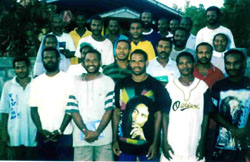Seminarians
By Father Greg Bourke

Seminarians is a term we use to describe young men who are in training to become priests. The training house is called a seminary. All men who wish to become priests must attend a seminary.
In Papua New Guinea we have Minor and Major seminaries. A seminary is where students can obtain Grafde 12 of academic studies. There are a number of these minor seminaries in PNG. Students from the Aitape Dioces do Grades 11 and 12 in St. Fidelis Minor Seminary in Madang. It is thought that with more Secondary Schools reaching Grade 12 that the need for Minor Seminaries might decrease. At present the Aitape Diocese has ten students at St. Fidelis, Madang.
When they have completed their Grade 12 the students go to The Good Shepherd Seminary in Banz, Mt. Hagen. This is a Major Seminary. here the students spend three years studying philosophy and some theology. At present there are 13 students from the Aitape Diocese in the Good Shepherd seminary.
After these three years the students return to their diocese and do a pastoral year. This means they live in a parish for a year under the guidance of the pastor and gain practical experience of parish life. Two of the parishes used for this experience in the past have been Seim and Lemieng.
After the pastoral year the students go to St. John's seminary, Kairaru Island, Wewak, for a Spiritual year. As the name indicates this is a time of reflection and discernment. At the end of this year students are expected to make a mature decision to continue on to the priesthood or leave the program.
The next move is down to the Holy Spirit Seminary in Port Moresby. Here the students spend three years studying theology and preparing for ordination to the preisthood. After these three years they are normally ordained as deacons. at present there are 7 students from Aitape at the Holy Spirit Seminary.
After diaconate the sutdents return to Aitape for more parish experience3 and to prepare for ordiantion. This is arranged between the student and the Bishop.
All diocesan students are directly under the authority of the Bishop. He pays for their education and accepts or rejects their application for ordination. Other young men from the Aistpe Diocese opt to join Religious Orders or Congregations. These have their own training programs.
The diocesan students will eventually work in the Aitape Diocese. The religious students are at the disposal of their superiors and can be sent anywhere.